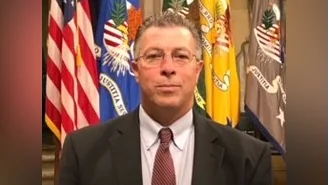The Congressional Record is a unique source of public documentation. It started in 1873, documenting nearly all the major and minor policies being discussed and debated.
“EXECUTIVE CALENDAR” mentioning Chuck Grassley was published in the Senate section on pages S2476-S2477 on May 12.
Of the 100 senators in 117th Congress, 24 percent were women, and 76 percent were men, according to the Biographical Directory of the United States Congress.
Senators' salaries are historically higher than the median US income.
The publication is reproduced in full below:
EXECUTIVE CALENDAR
The PRESIDING OFFICER. The clerk will report the nomination.
The senior assistant legislative clerk read the nomination of Ronald Stroman, of the District of Columbia, to be a Governor of the United States Postal Service for a term expiring December 8, 2028.
(Reappointment)
The PRESIDING OFFICER. The Senator from Iowa.
EAGLES Act of 2021
Mr. GRASSLEY. Madam President, today I would like to address the national plague of targeted violence. Whether it is in our schools, houses of worship, restaurants, businesses, or even on our city streets, these senseless killings are impacting all of us.
I woke up Friday morning, April 16, to learn of another tragedy, this time in Indianapolis, where a 19-year-old walked into a private business and proceeded to kill eight innocent workers, including four members of the Sikh community. My heart breaks for another set of families and friends newly devastated and the unthinkable happening to them.
While it is still early in the investigation and an exact motive remains unclear, all signs indicate that that young killer suffered from mental illness. The killer's own mother contacted authorities just last May for fear that he was going to commit what she called ``suicide by cop.''
The date of April 16 is unfortunately significant, as it is the solemn anniversary of the Virginia Tech massacre. Thirty-two students and educators lost their lives at the hands of a 23-year-old who had a well-documented record of mental illness. Despite clear homicidal warning signs, school authorities and counselors failed to intervene and help the troubled young man.
Earlier this April, tragedy struck when a 25-year-old man rammed his vehicle into a security barricade just steps from this Chamber. Fortunately for those inside, U.S. Capitol Police officers courageously intervened when the man brandished a large knife and lunged in their direction. As all of us know, this attacker tragically took the life of U.S. Capitol Police Officer Billy Evans. Officer Evans was a hero, and we mourn his loss.
While the Capitol attacker's exact motive is unknown, social media profiles indicate the man was a devout follower of a group that repeatedly holds racist, anti-Semitic, and anti-LGBTQ beliefs. It is too early to tell if these beliefs motivated this man to commit an act of terrorism, but what is clear is this man struggled with depression, hallucinations, and suicidal thoughts. If someone had properly identified these symptoms as warning signs, perhaps this tragedy could have been avoided.
I could go on and highlight tragedies from just the past several years from all over the country. Post-incident investigations show that all of these violent actors often suffer from variations of mental health concerns, including depression, anxiety, delusions, paranoia, bipolar disorder, suicidal and homicidal thoughts, and adherence to bizarre conspiracy theories. Many of those who are closest to these attackers were aware of their conditions, and some even expressed concern about their propensity for violence ahead of their times of killing.
The EAGLES Act of 2021 is a bipartisan, commonsense piece of legislation. This bill carries the namesake of the Parkland, FL, Marjory Stoneman Douglas High School mascot--the Eagles, that is--and it is a tribute to the 17 Eagles who tragically lost their lives 3 years ago at the hands of a former student struggling with severe behavioral problems and mental illness.
This legislation helps proactively mitigate threats of violence by reauthorizing as well as expanding the U.S. Secret Service's National Threat Assessment Center, which also goes by the acronym NTAC.
NTAC's approach is squarely focused on research. After every instance of mass violence, their team of social science experts canvasses the circumstances and the attacker's behavior to determine the facts.
NTAC's 2019 publication called ``Mass Attacks in Public Squares'' found that during the previous year, 93 percent of the attackers engaged in threatening or concerning communications prior to carrying out violent actions. Another 2019 NTAC study entitled ``Protecting America's Schools'' made an even more definitive finding related to violence in our educational system. This study concluded that all--in other words, every one--of the school attackers exhibited concerning behaviors prior to engaging in an act of violence.
A family member, a teacher, a coach, a fellow employee, or a neighbor's ability to observe someone's behavior, home life circumstances, work life factors, and other political stressors, coupled with NTAC's threat assessment training, can prevent harmful outcomes from occurring. But in order for this to be effective, we need to increase NTAC's ability to continue their research and get much needed training to their communities. The result will be increased opportunities for early intervention and referrals to mental health services for those in need and also get names to the FBI database so that they can't buy a gun.
Just recently, the EAGLES Act got a resounding endorsement from the National Association of Attorneys General. Forty attorneys general from all over the United States believe that NTAC's proactive approach is critical to violence prevention and its training programs are urgently needed. These attorneys general are responsible for ensuring safe communities and are urging our quick action to pass this legislation. We cannot afford to ignore or delay their explicit plea for assistance.
So now, as a bottom line, I ask all of my Senate colleagues to consider the commonsense, practical solution provided in the EAGLES Act. The more research and threat assessment training that we can provide, the more violence we can prevent





 Alerts Sign-up
Alerts Sign-up